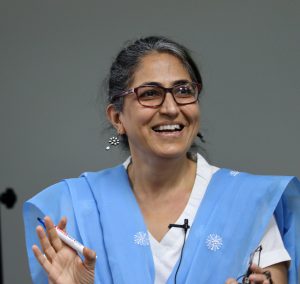In 1949, when India’s Constitution came into being, it articulated a vision of a society that secures and promotes the core human values of equality, fraternity, justice, and liberty among all its diverse citizens. Since then, time and again, both individuals and institutions have rallied for their rights and effected change based on the values enshrined in the Constitution.
Some notable examples are Mohammed Yasin, one of the first citizens to petition the Supreme Court in 1950 to protect his right to livelihood, and Ghulam Mohiudin Sheikh, who filed a Right to Information (RTI) application to find out why many people living in his village in Kashmir were not benefitting from a rural housing scheme. These are two among innumerable citizens who have protested different forms of injustice or put in the time to improve their neighbourhoods.
What makes one an active citizen?
Bryony Hoskins, who has worked extensively on active citizenship, loosely defines active citizens as those who engage in a “broad range of activities that promote and sustain democracy”. Unpacking this definition points to two aspects:
1. Active citizens undertake initiatives that strengthen a democracy. Depending on the context, this could include – community development, social service, voicing opinions, participating in gram sabhas or city councils, voting, petitioning, campaigning for elections, protesting, and other such endeavours. Active citizens must base these activities on certain values and principles—such as freedom of choice, equal voice and participation, and respect for others and for the law—that are essential for a democracy.
2. Developing active citizenship is not an automatic process—it is learned and practised over time. The process to become an active citizen involves debate and dialogue and recognising and resolving conflicts.
What role can community-based nonprofits play in shaping ACTiZENS?
As facilitators of social change and by virtue of working at the grassroots, community-based nonprofits are critical for developing active citizenship. Based on our work with several nonprofits, here are some simple steps we have identified that nonprofits can take to start incorporating active citizenship in their work with communities:
1. Display copies of the Preamble of the Indian Constitution in the head office, field offices, and community centres, preferably alongside the vision and values statements of the organisation. The Preamble can serve as a tool to facilitate discussions on different constitutional values and to examine the connections between the vision and values of the nation and those of the organisation. This offers a point of reference when handling any issues of inequality, injustice, or oppression.
2. Use copies of the Preamble in community meetings to discuss the roles and responsibilities of citizens. Pose questions such as: What kind of society are we hoping to build? What is expected of each of us and of state authorities? What are the values that should guide both citizens and the state? This can help them realise their own stake, articulate a common vision, and take ownership of working towards it.
3. Encourage community members to actively participate in gram sabha and ward-level meetings, as well as other platforms of local self-government. By participating in these conversations, people are empowered and contribute to shaping policies and initiatives that directly impact their communities.
4. Incorporate foundational training on constitutional values and framework (including rights, directive principles, the role of the state, and the law) into the internal team’s training processes. This will help embed a constitutional values lens into any programme the team undertakes and approaches.
As the Indian Constitution enters its 75th year, it is imperative for us citizens and nonprofits to embrace our roles as vital forces of development.
Let us remember that democracies are deepened through an informed, active and responsible citizenry. No government in the world can deliver good governance without the involvement of its people, its citizens.

Ms. Vinita Gursahani Singh is the managing trustee at We, The People Abhiyan. She has worked in the social development sector for the last 28 years, mainly in the areas of livelihoods, human rights, and active citizenship.
Her educational background is in management from the SP Jain Institute in Mumbai and in social policy from the London School of Economics.
